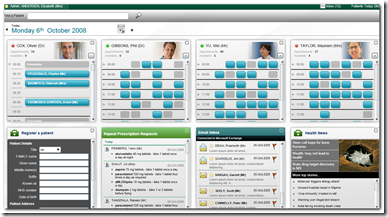The one word here that somewhat scares me is “consider”, is this not a given to fund Health IT? Algorithms rule the world and all decisions made so perhaps we can catch Congress up on the meaning and importance of Health IT. Again, I sure wish we hand some “hands on” folks at the top of the helm here that didn’t have to rely on staff to recommend and translate. Perhaps we could use some Congressional Algorithms.
Just last week Bill Gates spoke on the same subject, and there’s a “hands on” man, and if he were speaking to a “hands on” group, perhaps things could move along a a better pace and we wouldn’t have government agencies such as the FDA having to play catch up.
Watch the video from last week about the AHIC recommendations to the new administration. Most of it drags with thank you comments and a rolling of statistics, with a couple exceptions with Dr. Halamka who they call “the jet” as the video shows respect for him, but an ominous showing of “not understanding”, very clear in just everyone being themselves in the meeting. We need a fleet of “jets” in Washington that understand technology first hand to get away from what we have now. I wonder if those making decisions realize how important this is, other countries are dying for it and we keep thinking about it.
In addition, there’s another article stating some of reservations here:
Although direct financing of health IT is one way to raise levels of health IT adoption, he said, “I’m not sure that, by itself, it would lead to better care,” McClellan said.
I am not sure he understands algorithms.
Howard Dean, chairman of the Democratic National Committee and a medical internist, warned that standards and uses of systems underwritten by a stimulus would have to be widely tested and accepted before purchasing started.
How long do you think we have, the need is now and there are many standards that now exist, we can’t wait.
Dr. Jeffrey Kang, chief medical officer of CNA Healthcare and president of the eHealth Initiative, said he believed the health IT community was at an “inflection point” marking what the private sector could accomplish in setting up national health IT systems without greater involvement by the federal government.
I agree with private industry setting up a national health IT system, and the software for much of that is free and ready to be refined for the end user experience, called the Common User Interface, but the issue is getting the vendors to commit to the interface and make it easier to have a system that can communicate throughout, as the way it is set up now just due to the way electronic records have evolved, everyone wants to maintain being their own “island”. Even GE was considering starting from scratch in a recent post in this effort. Again, it just makes me think of how “hands on” knowledge would be so valuable with Congress.
Kang said one of his biggest worries was that consumer privacy concerns would bog down progress on health information streamlining in the coming year. “I’m worried that they won’t be able to figure it out in legislation,” he said.
Privacy issues, I just posted about PHRs with the Department of Defense working with Google Health and Microsoft HealthVault, I thought some of those issues were finally being put to bed.
John Glaser, vice president and chief information officer of Partners HealthCare System, said the government might use the $50 billion to get its own health IT house in order, especially in streamlining how Medicare systems link to health care provider programs and systems.
This is not a bad idea for the government to get their IT House in order, which needs to be done anyway.
When you stop and think about it, who has their IT Houses in order, Pharma and the Health Insurance business, and I am talking their business intelligence software which allows for projecting with some pretty sophisticated algorithms. What 2 large entities are controlling healthcare today in the US? I rest my case.
Anyway, as I mentioned above and referenced 2 of the smartest individuals around have been speaking up, but will they be heard and perhaps we can get some Congressional Algorithms in place, maybe? We could easily use some funds in educating consumers on personal health records as they are available to all, but few, including many physicians even know they exist. BD
Senate Health, Education, Labor and Pensions Committee Chair Edward Kennedy (D-Mass.) and ranking member Mike Enzi (R-Wyo.) introduced the bill (S 1693) to create a national electronic health record system more than a year ago, but privacy issues and funding concerns prevented the legislation from reaching the floor. On Thursday, an aide to Enzi said the senator has not seen enough details of the economic proposal to know whether adding health IT to it would "blow the budget." A Kennedy spokesperson, who declined to comment on the proposed stimulus package, said that Kennedy supports "quick action on the investments in health IT that President-elect Obama has called for" (Noyes, CongressDaily, 12/4).
Lawmakers Consider Adding Health IT to Stimulus Package – iHealthBeat
Related Reading:




0 comments :
Post a Comment